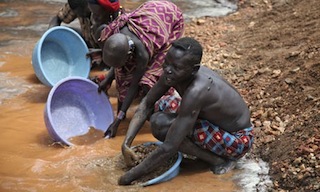Khartoum hosts Sudanese-South Sudanese talks on minerals
June 11, 2016 (KHARTOUM) – A senior South Sudanese delegation headed by the Minister of Minerals Taban Deng has arrived in the Sudanese capital, Khartoum Saturday in an official visit for several days to hold talks on the latest developments in Sudan’s mineral sector.

He pointed that the visit of South Sudan’s Minister of Minerals comes within the framework of the cooperation between the two countries to serve the joint interests, expressing their full readiness to cooperate to promote the minerals field in both countries particularly in light of the sharp decline in oil price compared to the rise in minerals price especially the gold.
“That is why they [South Sudanese] directed their efforts towards the minerals as we previously did in order to make both countries benefit from these minerals” he added.
Sudan’s gold production is expected to reach 100 tons this year, which will move Sudan second in Africa and the ninth worldwide in terms of production.
For his part, Deng said they came to Khartoum to discuss how Sudan’s Ministry of Minerals could participate to develop the South Sudanese minerals sector and to benefit from Sudan’s long experience in this field to change peoples’ life for the better.
“Minerals play important role in improving peoples’ economic conditions in both countries to the better,” he said.
“We are one people but the circumstances dictated that we live in two [separate] countries and that is why we should benefit from our presence in the two countries in investing our resources for the benefit of the two peoples” he added.
South Sudan seceded from Sudan on July 9th 2011 following a referendum on whether the semi-autonomous region should remain a part of the country or become independent. 99% of the southern voters chose independence.
Relations between the two nations soured after South Sudan’s independence following a series of disputes over a number of issues.
Last week, the Joint Political and Security Committee (JPSC) between the two countries signed a series of security agreements, including immediate re-deployment of joint military forces along the Safe Demilitarized Border Zone (SDBZ), and approved a plan to stop supporting and harbouring rebels as well as opening the crossings points.
(ST)
